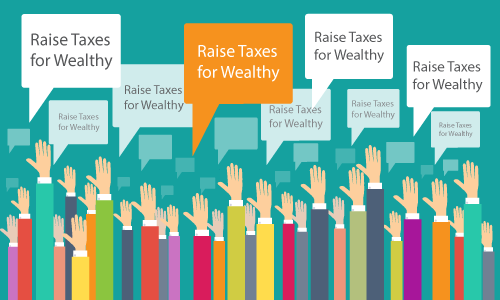Voters in Multiple States Choose Higher Taxes for the Wealthy

Of course, the big news from the election earlier this month was that Donald Trump shocked the world and defeated Hillary Clinton in the race to become the 45th president of the United States. However, there were several other important national, as well as local, election races and issues that were decided on November 8th. Not the least of which were several state measures aimed at raising taxes on high net worth individuals.
To that end, voters in both California and Maine decided that the rich needed to pay more taxes. In Maine, the vote to raise the state’s top tax rate from 7.15 percent to 10.15 percent was extremely close, passing by a narrow 50.4 percent to 49.6 percent margin. That means Maine will have the second highest top tax rate in the country in 2017, surpassing Oregon, which was number two in 2016 at 9.9 percent.
In California, meanwhile, the vote wasn’t even close, with 62 percent voting to extend temporary tax hikes already in place. Proposition 55 extended the hikes originally implemented in 2012 with Proposition 30. That means top earners, those who make $1 million or more a year, will continue to pay a tax rate of 13.3 percent at least until 2030. California will continue to have the highest tax rate for top earners in 2017.
So, while all signs point to Donald Trump lowering the federal tax rates, if you live in California or Maine and you’re a top earner, you won’t see any relief in the coming years in your state taxes.
http://www.forbes.com/sites/ashleaebeling/2016/11/10/voters-okay-state-income-tax-hikes-for-the-rich/#71480a7b16d0
Top Ten Real Estate Tax Breaks
Here’s a look at the Top 10 Real Estate Tax Breaks for the homeowner/investor. Real Estate Tips 1-3 1. Mortgage Loan Interest: Deductions reduce your taxable income against which your taxes due are calculated.2. Home Improvement Loan Interest: You can deduct all the interest on a home improvement loan provided the work is a “capital improvement”…
GROCO’s Mission Statement
GROCO’s Mission Statement About GROCO At Greenstein, Rogoff, Olsen & Co., we strive to deliver the best service to our clients. We are successful because we stay true to our vision, work hard toward our mission, and employ a series of core values. Our Vision is to be the most trusted advisors in the Bay Area serving…
Choosing a Real Estate Investment Market
Choosing a Real Estate Investment Market OK, everyone’s heard the old saying that “Location, Location, Location” is the most important factor when buying real estate right? But what does that really mean? What about a location should you know before buying a property for long term rental? Buying because the property’s in your own home…
Shareholders Pleased as Musk Decides Against Taking Tesla Private
The shareholders are pleased that Elon Musk decided against taking tesla private in what was sure to be a controversial move. Not wholly unlike several bold and surprising moves the worlds most famous entrepreneur has done in recent years. Tesla’s CEO Elon Musk recently created quite a stir after suggesting he was considering taking his…




